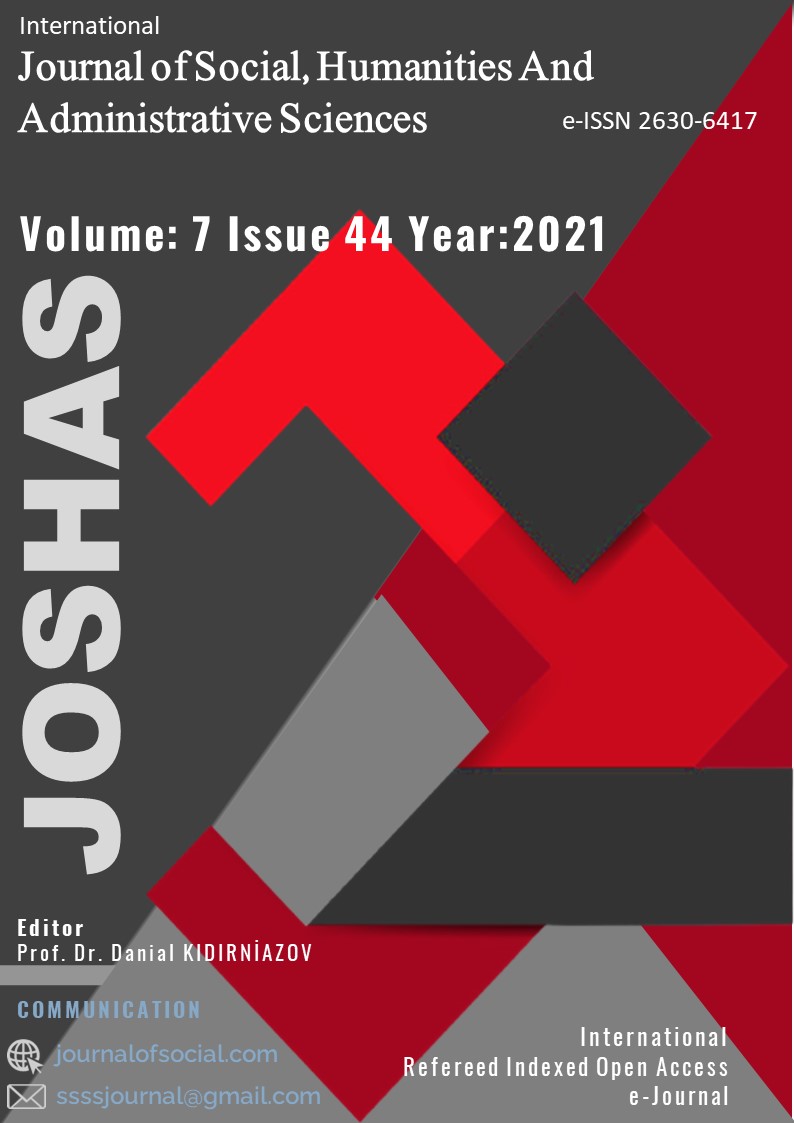Author :
Abstract
Bu çalışmada 1950-1960 yılları arasında ortaokul ders kitaplarında aktarılan yurttaşlık anlayışı incelenmiştir. Ülkemizde yurttaşlık eğitiminin başlangıcı Osmanlı’nın son dönemine kadar gider. Ulus devletin inşası sürecinde makbul vatandaşın yetiştirilmesi ve Cumhuriyet ideolojisinin aktarılması amaçlanmıştır. Bu doğrultuda cumhuriyetin bireyini yetiştirmek amacıyla eğitim seferberliği yapılmıştır. II. Dünya Savaşı’ndan sonra çok partili hayata geçen Türkiye, “Soğuk Savaş” sürecinde tercihini Batı Blok’undan yana yapmıştır. Menderes hükümeti liberal değerler ve beklentileri karşılayacak sosyal ve politik adımlar atmıştır. Tarımda hızlı makineleşme sonucunda köyden kente yoğun bir göç yaşanmış, köy enstitüleri kapatılmış, toprak reformundan vazgeçilmiş, makbul yurttaş yeniden tanımlanmıştır. Buna göre toplumsal düzeni korumak, kente uyum sürecini kolaylaştırmak, politik ve ekonomik sistemleri yeniden üretmek amacıyla makbul yurttaş yaratmak fikri yurttaşlık bilgisi ders kitaplarında sık sık vurgulanmıştır. Makbul yurttaş; toplumsal kurallara uyan, milli ve manevi duygularla desteklenmiş kişi olarak tanımlanmıştır. 1950-1960 arasında siyasal, sosyal ve ekonomik alanda yaşanan değişimlerin yurttaşlık eğitimi dersinin içeriğine yansıdığı görülmüştür. Bu kapsamda vatanseverlik duygusunun yüksek tutulduğu dinine, geleneklerine bağlı modern, üretken liberal bireye makbul yurttaş denilmiştir. Makbul yurttaşı tanımlayan ders kitapları, nitel araştırmalar için en uygun gözlem aracıdır. Bu kapsamda 1950- 1960 yılları arasında Milli Eğitim Bakanlığı’nın okuttuğu “Ortaokul Yurttaşlık Bilgisi” ders kitapları incelenerek araştırmanın amaçları doğrultusunda hazırlanan bazı sorulara cevap aranmıştır. Veriler içeriklerine göre tematik analize tabi tutulmuş ve yorumlanmıştır. En dikkat çeken bulgu, kentli yurttaş tipinin inşası için kazandırılması gereken görgü kurallarıdır. Ayrıca toplumsal düzeni sağlayan kurallara uymak, siyasal hak ve sorumluluklarını bilen, ülkesinin iktisadi düzenine uyumlu, çağdaş değerleri içselleştirmiş bir vatandaşlığın arzulandığı görülmüştür.
Keywords
Abstract
In this study, the understanding of citizenship transferred in secondary school text boks between 1950-1960 is examined. The beginning of civic education in our country goes back to the last period of the Ottoman Empire. In the process of building the nation-state, it was aimed to train acceptable citizens and to convey the ideology of the Republic. In this direction, an education campaign was carriedout to raise the individual of the republic. Turkey, which became a multi-party system after the Second World War, made its choice in favor of the Western Bloc duringt he "ColdWar" process. The Menderes government took socialand political steps to meet liberal values and expectations. As a result of rapid mechanization in agriculture, there was an in tensemigration from village to city, village in stitutes were closed, land reform was abandoned, and the acceptable citizen was redefined. Accordingly, the idea of creating acceptable citizens top reserve the social order, facilitate the process of adaptation to the city, and re produce the political and economic systems has been frequently emphasized in the citizen ship text books. An acceptable citizen is defined as a person who obeys social rules and is supported by national and moral feelings. It has been observed that the changes in the political, social, and economic fields between 1950-1960 were reflected in the content of the civiceducation course. In this context, a modern, productive liberal individual who adheresto his religion and traditions, with a high sense of patriotism, is called an acceptable citizen. Text boks describing the acceptable citizen are the most appropriate observation tools for qualitative research. In this context, the "Secondary School Civics" text boks taught by the Ministry of National Education between 1950 and 1960 were examined and answers weres ought to some questions prepared in line with the aims of the research. The data were subjected to the maticanalys is an dinterpreted according to the ircontent. The most striking finding is the manners and rules that must be gained for the construction of the urban citizen type. In addition, it has been seen that a citizenship that provides social order, obeys the rules, knows its political rights and responsibilities, is compatible with the economic order of the country, and has internalized contemporary values is desired.
Keywords
- Aksan, H. (1952). Yurttaşlık Bilgisi I. Sınıf, Ders Kitapları Yayınevi, İstanbul
- Aksan, H. (1952). Yurttaşlık Bilgisi I. Sınıf, Ders Kitapları Yayınevi, İstanbul
- Aybay, R.(1998). “Teba-i Osmani”den “T.C. Yurttaşı”na Geçişin Neresindeyiz? 75 Yılda Tebaa’danYurttaş’a Doğru, (ed. A. Ünsal), Tarih Vakfı Yayınları, İstanbul.
- Butakın, M. (2003). Üniter Düşüncenin Sonu: Özgürlük Önermeleri; Avesta Basın Yayın. Gökalp, Z. (1950). Yurttaşlık Bilgisi I, Berrin Basımevi, İzmir.
- Kan, Ç. (2009). Değişen Değerler ve Küresel Vatandaşlık Eğitimi; Kastamonu Eğitim Dergisi,17(3),895- 904.
- Keyman, E. Fuat, İçduygu, A. (2005). Türk Modernleşmesi ve Ulusal Kimlik Sorunu: AnayasalVatandaşlık ve Demokratik Açılım Olasılığı, Ed. Ünsal, 75 Yılda Tebaadan Yurttaşa Doğru.Kılıç, A. (2006). 1970-1990 Arası Dönemde Türkiye’de Yurttaşlık Bilgisi Kitaplarındaki Yurttaşlık Anlayışı, İstanbul Üniversitesi Sosyal Bilimler Enstitüsü, İstanbul.
- Pazarlı, O. (1959). Yurttaşlık Bilgisi Ortaokul III, Remzi Kitabevi, İstanbulTaşkıran, T. (1950). Yurttaşlık Bilgisi II, Milli Eğitim Basımevi, AnkaraTaşkıran, T. (1950). Yurttaşlık Bilgisi III, Milli Eğitim Basımevi, Ankara
- Ulutaş, E. (2014). Türkiye'de Vatandaşlık ve Anayasal Süreç, Akademik İncelemeler, C.9, S,1, ss. 73-102.Ünsal, A. (1998). Yurttaşlık Anlayışının Gelişimi, 75 Yılda Tebaa’danYurttaş’a Doğru, Ed. Artun Ünsal, İstanbul, Tarih Vakfı Yurt Yayınları, s. 1-36.
- Üstel, F. (2004). Makbul Vatandaşın Peşinde; II. Meşrutiyet’ten Bugüne Vatandaşlık Eğitimi, İletişim Yayınları; İstanbul
- Yıldırım, A. ve Şimşek, H. (2011). Sosyal Bilimlerde Nitel Araştırma Yöntemleri, Seçkin Yayıncılık, Ankara
- Toprak, Z.(1998) Bir yurttaş yaratmak: Muasır bir medeniyet için seferberlik bilgileri,Yapı Kredi Kültür Sanat Yayıncılık, İstanbul





